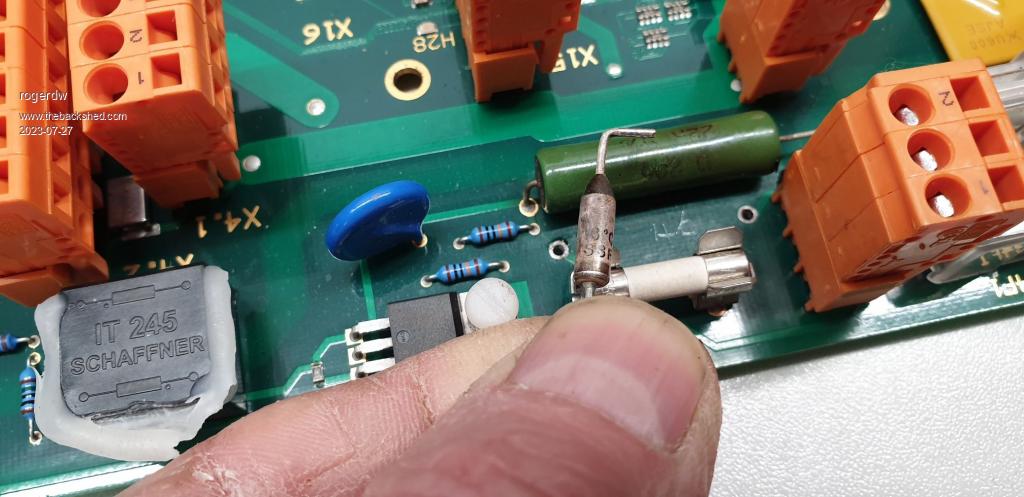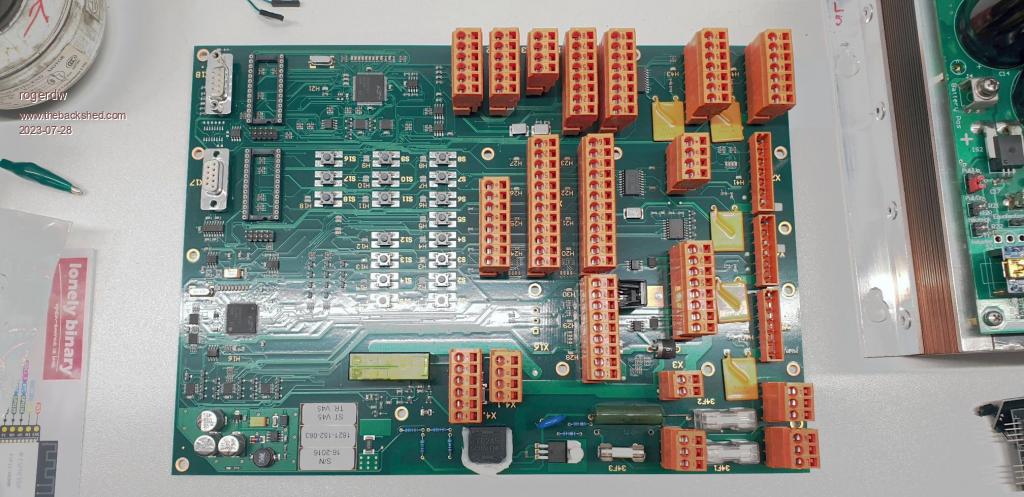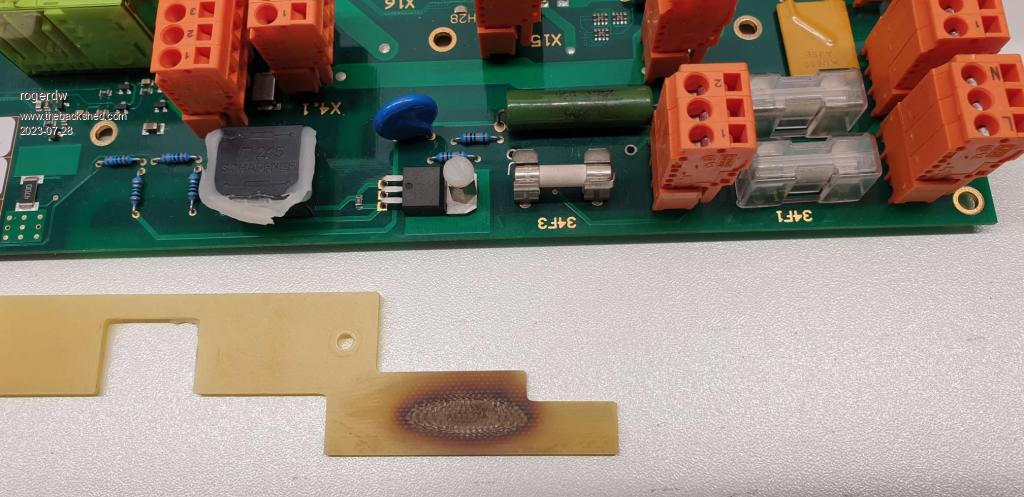| Author |
Message |
rogerdw
Guru

Joined: 22/10/2019
Location: AustraliaPosts: 949 |
| Posted: 01:35am 27 Jul 2023 |
 Copy link to clipboard Copy link to clipboard |
 Print this post |
|
As some of you may know, I earn my living fixing circuit boards and regularly get asked to fix boards I've never seen before and with zero documentation.
Anyway, the local meatworks brought in this board with an open circuit thermal fuse ... and they had a replacement for me to fit. Problem is the replacement is 184 degree and I'm pretty sure that's not a good idea.
See image, but it sits alongside a 22 ohm 7 watt resistor and inline with a normal fuse ... so I expect that it's meant to fail if the resistor gets too hot.
The board has 46 scratched onto it ... but the old fuse has been damaged and can only really read the 6 and degree marks. The only fuses I can find ending in '6' are 76 or 126 or 216 ... and the lowest I can find is 70 degrees.
What temp would you choose? Thanks.

Cheers, Roger |
| |
Solar Mike
Guru

Joined: 08/02/2015
Location: New ZealandPosts: 1175 |
| Posted: 03:01am 27 Jul 2023 |
 Copy link to clipboard Copy link to clipboard |
 Print this post |
|
Those ceramic resistors can easily exceed 150 Celsius and will unsolder themselves if they get too hot; a 76C fuse would prevent that happening.
Cheers
Mike |
| |
phil99

Guru

Joined: 11/02/2018
Location: AustraliaPosts: 2873 |
| Posted: 04:08am 27 Jul 2023 |
 Copy link to clipboard Copy link to clipboard |
 Print this post |
|
60/40 solder melts at about 184C and lead free solder's melting point is around 230C so you may be able to use the one they gave you.
If you want to be conservative the 126C one would be as low as I would go. |
| |
pd--
Senior Member

Joined: 11/12/2020
Location: AustraliaPosts: 122 |
| Posted: 02:03pm 27 Jul 2023 |
 Copy link to clipboard Copy link to clipboard |
 Print this post |
|
Its been running very hot
you can see the edge of the orange connector is black
and the board is starting to delaminate
i would think that it is probably a 176c fuse
The 184 is as close as you are likely to get
The only hit i got on 176 was Russian |
| |
wiseguy

Guru

Joined: 21/06/2018
Location: AustraliaPosts: 1234 |
| Posted: 10:08pm 27 Jul 2023 |
 Copy link to clipboard Copy link to clipboard |
 Print this post |
|
Roger, without the benefit of being able to see more of the PCB & application, is it a soft start circuit ?
The resistor passes a limited starting current but the triac? (if that is what it is) then handles the running current & in doing so diverts the current from the resistor ?
Maybe the triac / triggering device is misbehaving causing too much current through the resistor ?
Good luck, there's nothing like flying blind - done a lot of that lol
If at first you dont succeed, I suggest you avoid sky diving....
Cheers Mike |
| |
rogerdw
Guru

Joined: 22/10/2019
Location: AustraliaPosts: 949 |
| Posted: 12:44am 28 Jul 2023 |
 Copy link to clipboard Copy link to clipboard |
 Print this post |
|
Thanks for the input guys ... it's probably the main thing I miss working on my own for all these years. Amazing how easy it is to miss all the other angles.
Yes, it has been running hot ... the cover that sits above it is quite heat damaged and I ground away a number of layers that were all blackened. Having said that, the resistor doesn't look too stressed ... it's not unusual to see those types all blackened and outer layers flaking off, yet still the correct resistance.
I hadn't even looked at what the other device was. Turns out you're right Mike, it is a triac ... BTB24-600. I will investigate that idea as well.
Normally I ask all sorts of questions when boards come in ... but this was supposed to be an easy part swap, so I didn't ask much at all. No idea what its function is ... mainly seems to be a junction board but with a heap of buttons and a couple of micros.
Thanks again all you guys for your input.


Cheers, Roger |
| |
wiseguy

Guru

Joined: 21/06/2018
Location: AustraliaPosts: 1234 |
| Posted: 08:52pm 28 Jul 2023 |
 Copy link to clipboard Copy link to clipboard |
 Print this post |
|
Roger, I have had second thoughts about that bit of circuitry and what it may really do.
In power supplies a soft start to a capacitor is often used, but usually not on a remote PCB.
I think it probably has an inductive load and works essentially the opposite to a soft starter.
An AC contactor may require a large pull in current but only for maybe a hundred or so milliseconds, as the armature pulls in completely it also completes the magnetic field which previously had a large air gap and therefore a low inductance (and higher current).
Once pulled in the holding current required is much smaller and the triac for the pulling in current can be turned off allowing holding current through the "efficiency" resistor.
This resistor will get hot as it continually passes the holding current (if its got a micro they could have just reduced the firing angle of the triac to reduce the holding current...).
So if someone replaces the contactor with a different one with a lower impedance the resistor may run hotter and open the fuse, or if it is designed for 220V our mains sometimes >245V could make it run hotter, or if the contactor is worn or corroded the magnetic circuit may be lossy causing more current to flow etc.
Is it an imported unit for 60Hz maybe the lower Xl at 50Hz creates more current, so many things to consider ?
Replacing the thermal fuse may be treating the symptoms but not fixing the actual problem.
Of course this is still flying blind theory but I reckon closer to being on the money this time.
Edited 2023-07-29 09:20 by wiseguy
If at first you dont succeed, I suggest you avoid sky diving....
Cheers Mike |
| |

